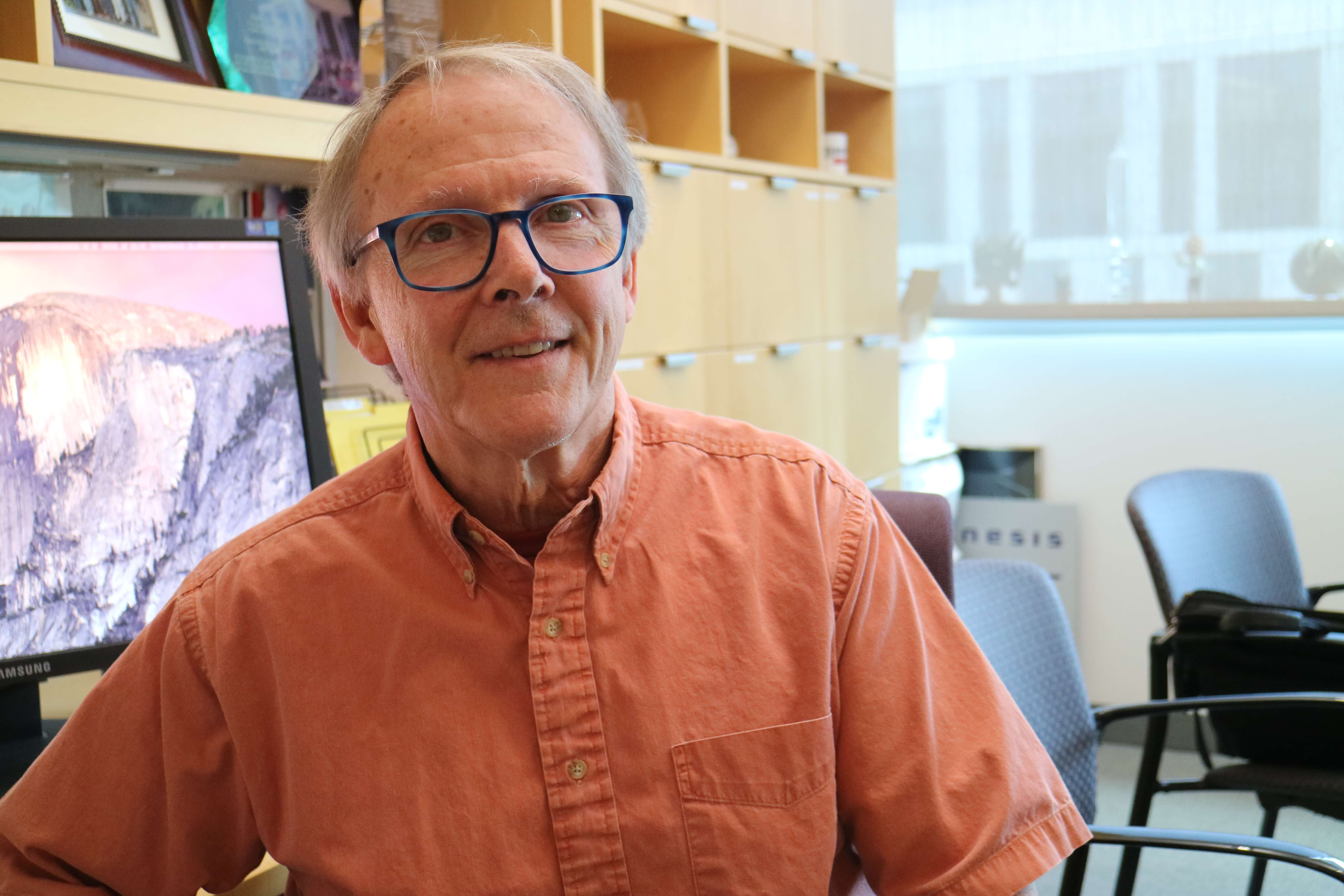
Q: In a couple sentences, what do you do in your work?
A: I’m interested in how cells change in cancer and how we can treat them with antibodies. A lot of it is the major cancers, like pancreatic cancer, prostate cancer, lung cancer and blood borne cancers. I also work with postdocs and PhD students, which is fun...Great minds that are thinking new and bold thoughts, and getting to exchange ideas and work with them on their experiments.
Q: What is the goal when studying how cells change in cancer? Is it to help develop a pattern?
A: Cells have various compartments, and one of my favorite compartments now is the cell surface, because it’s the eyes, ears, nose of the cell. Of the genes that are in the cell, (there are about 20,000 genes in the cell) about 4,000 of these genes encode proteins that stick out through the cell membrane, which is 20% of the protein is sitting on the cell surface. It’s like the keyboard to your computer; it’s the buttons that determine how the cell is going to respond to cellular stimuli that are coming from the outside. This cell membrane keeps each cell as a separate city onto itself and it has to learn how to interact with the economies that are there in the tissues.
So, to me, these buttons are really really interesting, and they change when cells become cancerous. If we can find antibodies to specific buttons or control those buttons, we might be able to kill cancer cells, specifically over normal cells.
Q: What’s your favorite part about being a scientist?
A: The freedom to invent and explore new ideas and areas of biology that others haven’t.
Q: Did you always know you wanted to work in this field, is it what you studied?
A: I’ve always been interested in health and research. I started with my undergraduate work in biochemistry at Berkeley, where I’ve had the fortune to be trained by some of the leading pioneers of molecular enzymology. I then moved to graduate school at Washington state, where I got to work with chemists and biologists on understanding how muscle contraction works. From there I moved to Stanford to learn about molecular biology and I was the founding member of the protein engineering department at Genentech and got to work there on engineering proteins and understanding how we can design them for new functions and protein engineering. That got me really interested in protein therapeutics, and then I came here in 2005.
Q: What have you created or discovered that you are most proud of?
A: One is we take a normal cell and we’ll put oncogenes into them. Oncogenes are your genes, but they have been changed/mutated. One in particular, KRAS, for example is one of the oncogenes to be mutated and found in cancers. We found how the cell surface changes when an oncogene takes over a cell. Why would you think that it would happen? Well, that cancer cell has to learn how to evade the immune system, metastasize to other places, and survive despite not having a normal vasculature and its need to eat all the time… How to be an aggressive grower and escape the laws that the tissue has set up. It has to change the cell surface in order to do that, and when it does that we can make antibodies that will attack those cells.
Q: At the end of the day, why does your work matter?
A: Because I think cancer matters. If we can find out the molecular basis for disease, especially as it relates to the cell surface, then we’re in a better position to develop therapeutics that can attack them. In the area of biotechnology, all those biotech drugs work on cell surface proteins, so there are lots of precedents for those.
Q: Outside of work, what do you do to relax?
A: I like playing tennis, playing the guitar, skiing, hiking, and visiting my son, daughter in law and their new child. I wish I had more time for this, but I have enough time to do that.
Q: What situation do you think you’d feel the most out-of-place in? What is something that makes you uncomfortable?
A: Politics is far from my comfort zone. I don’t mean politics from the point of view of getting along with people; I think that’s critical. We all can get better at doing that. Running for office would be outside of my comfort zone.
Q: In 100 years, what do you want to be remembered for?
A: I’d like to be remembered for the inventions we’ve created and the drugs that we’ve made.